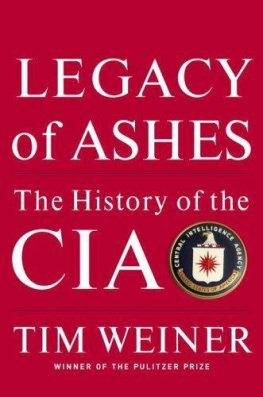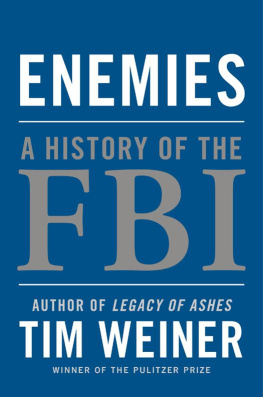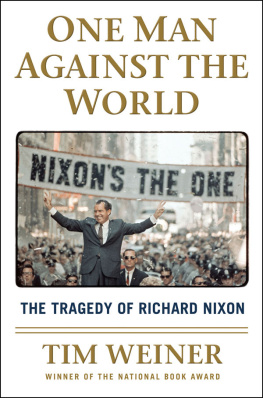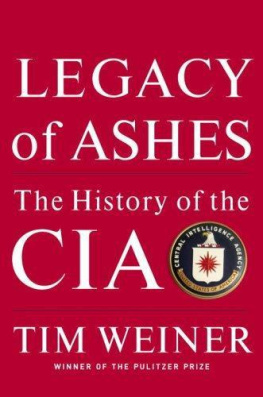Tim Weiner - Legacy of Ashes: The History of the CIA
Here you can read online Tim Weiner - Legacy of Ashes: The History of the CIA full text of the book (entire story) in english for free. Download pdf and epub, get meaning, cover and reviews about this ebook. year: 2008, publisher: Anchor, genre: History. Description of the work, (preface) as well as reviews are available. Best literature library LitArk.com created for fans of good reading and offers a wide selection of genres:
Romance novel
Science fiction
Adventure
Detective
Science
History
Home and family
Prose
Art
Politics
Computer
Non-fiction
Religion
Business
Children
Humor
Choose a favorite category and find really read worthwhile books. Enjoy immersion in the world of imagination, feel the emotions of the characters or learn something new for yourself, make an fascinating discovery.
- Book:Legacy of Ashes: The History of the CIA
- Author:
- Publisher:Anchor
- Genre:
- Year:2008
- Rating:4 / 5
- Favourites:Add to favourites
- Your mark:
- 80
- 1
- 2
- 3
- 4
- 5
Legacy of Ashes: The History of the CIA: summary, description and annotation
We offer to read an annotation, description, summary or preface (depends on what the author of the book "Legacy of Ashes: The History of the CIA" wrote himself). If you haven't found the necessary information about the book — write in the comments, we will try to find it.
Legacy of Ashes: The History of the CIA — read online for free the complete book (whole text) full work
Below is the text of the book, divided by pages. System saving the place of the last page read, allows you to conveniently read the book "Legacy of Ashes: The History of the CIA" online for free, without having to search again every time where you left off. Put a bookmark, and you can go to the page where you finished reading at any time.
Font size:
Interval:
Bookmark:

Legacy of Ashes
Tim Weiner

CONTENTS
For Kate, Emma, and Ruby
There are no secrets that time does not reveal.
--Jean Racine, Britannicus (1669)
AUTHOR'S NOTE
Legacy of Ashes is the record of the first sixty years of the Central Intelligence Agency. It describes how the most powerful country in the history of Western civilization has failed to create a first-rate spy service. That failure constitutes a danger to the national security of the United States.
Intelligence is secret action aimed at understanding or changing what goes on abroad. President Dwight D. Eisenhower called it "a distasteful but vital necessity." A nation that wants to project its power beyond its borders needs to see over the horizon, to know what is coming, to prevent attacks against its people. It must anticipate surprise. Without a strong, smart, sharp intelligence service, presidents and generals alike can become blind and crippled. But throughout its history as a superpower, the United States has not had such a service.
History, Edward Gibbon wrote in The Decline and Fall of the Roman Empire, is "little more than the register of crimes, follies, and misfortunes of mankind." The annals of the Central Intelligence Agency are filled with folly and misfortune, along with acts of bravery and cunning. They are replete with fleeting successes and long-lasting failures abroad. They are marked by political battles and power struggles at home. The agency's triumphs have saved some blood and treasure. Its mistakes have squandered both. They have proved fatal for legions of American soldiers and foreign agents; some three thousand Americans who died in New York, Washington, and Pennsylvania on September 11, 2001; and three thousand more who have died since then in Iraq and Afghanistan. The one crime of lasting consequence has been the CIA's inability to carry out its central mission: informing the president of what is happening in the world.
The United States had no intelligence to speak of when World War II began, and next to none a few weeks after the war ended. A mad rush to demobilize left behind a few hundred men who had a few years' experience in the world of secrets and the will to go on fighting a new enemy. "All major powers except the United States have had for a long time past permanent worldwide intelligence services, reporting directly to the highest echelons of their Government," General William J. Donovan, the commander of the wartime Office of Strategic Services, warned President Truman in August 1945. "Prior to the present war, the United States had no foreign secret intelligence service. It never has had and does not now have a coordinated intelligence system." Tragically, it still does not have one.
The CIA was supposed to become that system. But the blueprint for the agency was a hasty sketch. It was no cure for a chronic American weakness: secrecy and deception were not our strengths. The collapse of the British Empire left the United States as the sole force able to oppose Soviet communism, and America desperately needed to know those enemies, to provide foresight to presidents, and to fight fire with fire when called upon to light the fuse. The mission of the CIA, above all, was to keep the president forewarned against surprise attack, a second Pearl Harbor.
The agency's ranks were filled with thousands of patriotic Americans in the 1950s. Many were brave and battle-hardened. Some had wisdom. Few really knew the enemy. Where understanding failed, presidents ordered the CIA to change the course of history through covert action. "The conduct of political and psychological warfare in peacetime was a new art," wrote Gerald Miller, then the CIA's covert-operations chief for Western Europe. "Some of the techniques were known but doctrine and experience were lacking." The CIA's covert operations were by and large blind stabs in the dark. The agency's only course was to learn by doing--by making mistakes in battle. The CIA then concealed its failures abroad, lying to Presidents Eisenhower and Kennedy. It told those lies to preserve its standing in Washington. The truth, said Don Gregg, a skilled cold-war station chief, was that the agency at the height of its powers had a great reputation and a terrible record.
Like the American public, the agency dissented at its peril during the Vietnam War. Like the American press, it discovered that its reporting was rejected if it did not fit the preconceptions of presidents. The CIA was rebuked and scorned by Presidents Johnson, Nixon, Ford, and Carter. None of them understood how the agency worked. They took office "with the expectation that intelligence could solve every problem, or that it could not do anything right, and then moved to the opposite view," notes a former deputy director of central intelligence, Richard J. Kerr. "Then they settled down and vacillated from one extreme to the other."
To survive as an institution in Washington, the agency above all had to have the president's ear. But it soon learned that it was dangerous to tell him what he did not want to hear. The CIA's analysts learned to march in lockstep, conforming to conventional wisdom. They misapprehended the intentions and capabilities of our enemies, miscalculated the strength of communism, and misjudged the threat of terrorism.
The supreme goal of the CIA during the cold war was to steal Soviet secrets by recruiting spies, but the CIA never possessed a single one who had deep insight into the workings of the Kremlin. The number of Soviet spies with important information to reveal--all of them volunteers, not recruits--could be counted on the fingers of two hands. And all of them died, captured and executed by Moscow. Almost all had been betrayed by officers of the CIA's Soviet division who were spying for the other side, under Presidents Reagan and George H. W. Bush. Under Reagan, the CIA set off on misconceived third-world missions, selling arms to Iran's Revolutionary Guards to finance a war in Central America, breaking the law and squandering what trust remained reposed in it. More grievously, it missed the fatal weakness of its main enemy.
It fell to machines, not men, to understand the other side. As the technology of espionage expanded its horizons, the CIA's vision grew more and more myopic. Spy satellites enabled it to count Soviet weapons. They did not deliver the crucial information that communism was crumbling. The CIA's foremost experts never saw the enemy until after the cold war was over. The agency had bled the Soviets by pouring billions of dollars of weapons into Afghanistan to help fight the Red Army's occupying forces. That was an epic success. But it failed to see that the Islamic warriors it supported would soon take aim at the United States, and when that understanding came, the agency failed to act. That was an epochal failure.
The unity of purpose that held the CIA together during the cold war came undone in the 1990s, under President Clinton. The agency still had people who strove to understand the world, but their ranks were far too thin. There were still talented officers who dedicated themselves to serving the United States abroad, but their numbers were far too few. The FBI had more agents in New York than the CIA had officers abroad. By the end of the century, the agency was no longer a fully functioning and independent intelligence service. It was becoming a second-echelon field office for the Pentagon, weighing tactics for battles that never came, not strategies for the struggle ahead. It was powerless to prevent the second Pearl Harbor.
Font size:
Interval:
Bookmark:
Similar books «Legacy of Ashes: The History of the CIA»
Look at similar books to Legacy of Ashes: The History of the CIA. We have selected literature similar in name and meaning in the hope of providing readers with more options to find new, interesting, not yet read works.
Discussion, reviews of the book Legacy of Ashes: The History of the CIA and just readers' own opinions. Leave your comments, write what you think about the work, its meaning or the main characters. Specify what exactly you liked and what you didn't like, and why you think so.









